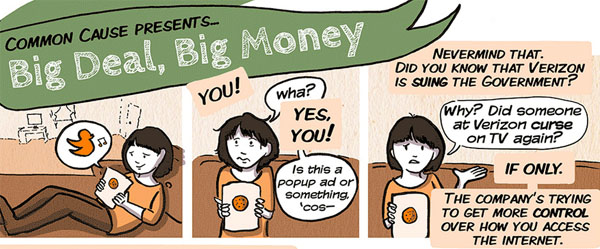Common Cause Network Neutrality Comic
We have reported on network neutrality many times in the past. This has been a policy debate on whether Internet service providers should be able to prioritize some content at the expense of others - should Comcast be able to charge me more to visit Fox News than it does to reach MSNBC? Should it be able to make YouTube videos very slow to load and unreliable unless I pay a special fee to access that site? This is the question of network neutrality.
Common Cause just released a "comic book" that takes a look at the concept, the political influences, and the consequences we may face if we lose network neutrality. "Big Deal, Big Money" also provides some options for action.
A short snippet:
Read Big Deal, Big Money here.

